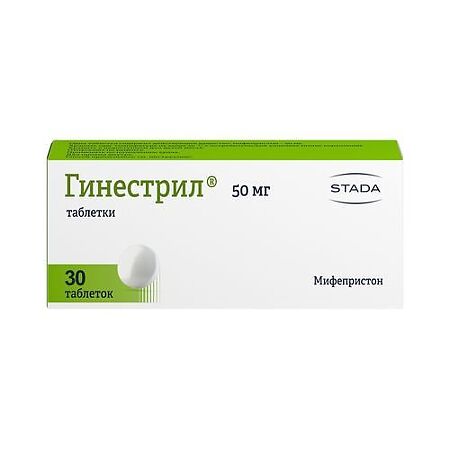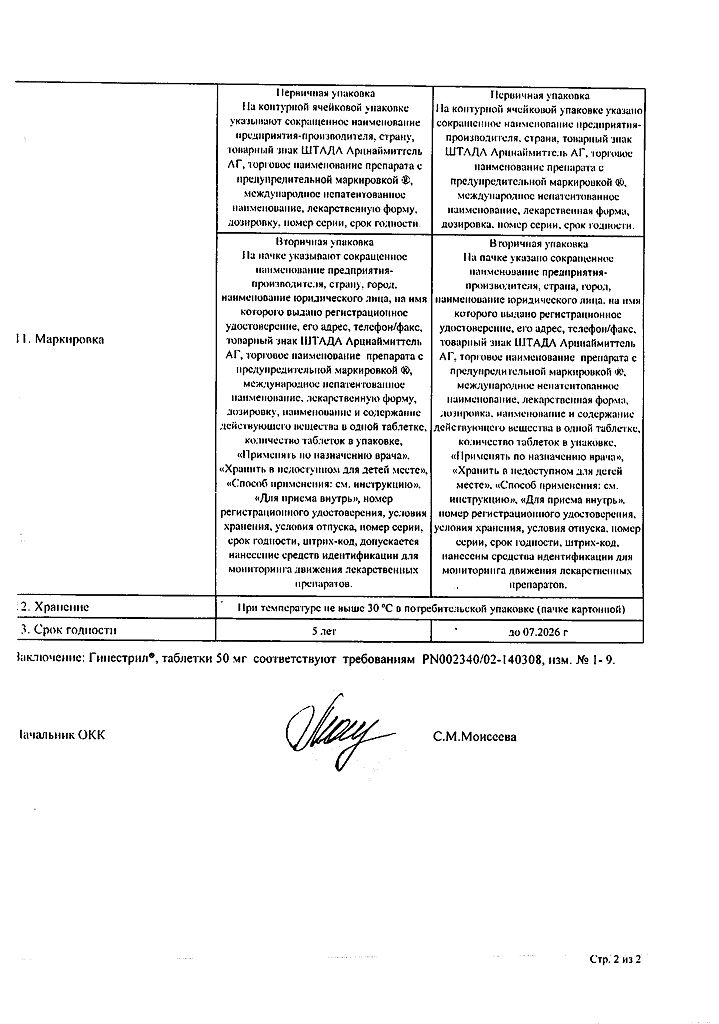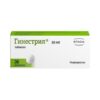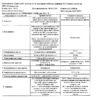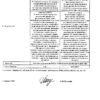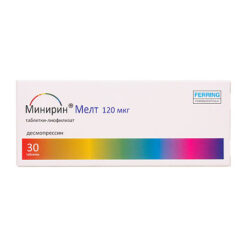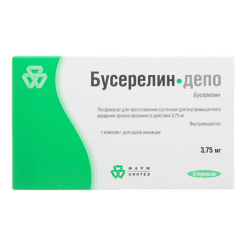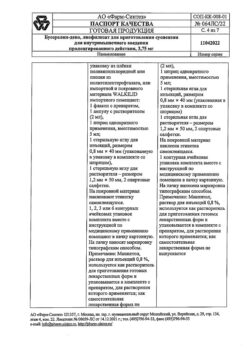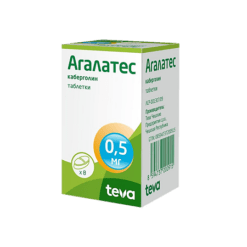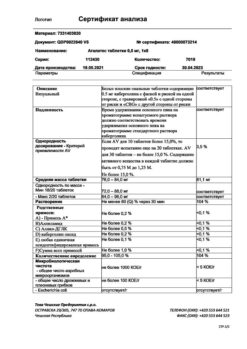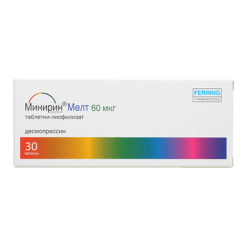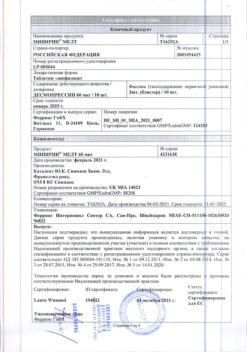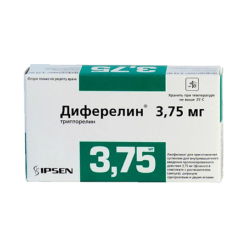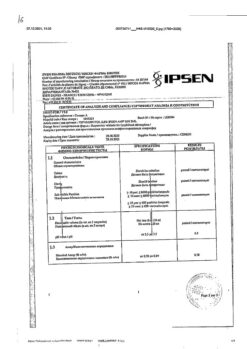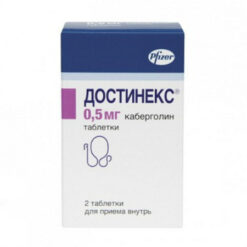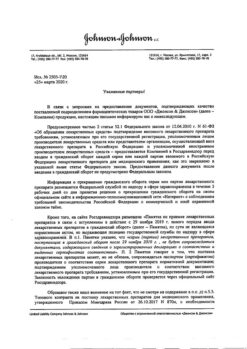No products in the cart.
Ginestril, tablets 50 mg 30 pcs
€199.94 €166.61
Description
Pharmacotherapeutic group: Antigestagen
Pharmacological action
Gynestril® is a synthetic steroidal antigestagenic drug (blocks the effect of progesterone at the receptor level), it has no gestagenic activity. Antagonism with glucocorticoids has been noted (due to competition at the level of receptor binding).
The key role in the pathogenesis of uterine leiomyoma is played by sex hormones, especially progesterone. Use of mifepristone as a progesterone receptor blocker may help both to inhibit tumor growth and to reduce the size of myomatous nodes and the uterus.
Pharmacokinetics
Intake. After administration Cmax is reached after 1.3 h. Bioavailability is 69%.
Distribution and metabolism. Binding of mifepristone with plasma proteins, albumin and acidic alpha1-glycoprotein, is 98%.
Metabolized with the participation of CYP3A4 isoenzyme by demethylation and hydroxylation to form three active metabolites.
Excretion. After the distribution phase, excretion is slow at first, the concentration decreases 2-fold between 12-72 h, then more rapidly with a T1/2 of 18 h. The terminal T1/2 (including for all active metabolites) reaches 90 h. It is excreted mainly through the intestine (about 90%).
Indications
Indications
Active ingredient
Active ingredient
Composition
Composition
Active ingredients:
mifepristone 50 mg
Excipients: microcrystalline cellulose, sodium carboxymethyl starch, talcum, calcium stearate.
How to take, the dosage
How to take, the dosage
Interaction
Interaction
Given that the CYP3A4 isoenzyme is involved in the metabolism of mifepristone, it is possible that concomitant use of inhibitors of this isoenzyme (ketoconazole, itraconazole, erythromycin grapefruit juice) may increase and inducers (rifampicin, dexamethasone, St. John’s wort, phenytoin, phenobarbital, carbamazepine) may decrease mifepristone plasma concentrations. Caution should be exercised when using mifepristone concomitantly with drugs which are CYP3A4 substrates and have a narrow therapeutic range (including drugs for general anesthesia), due to possible increase in plasma concentrations of these drugs.
Concomitant use of mifepristone and NSAIDs may increase plasma concentrations of the latter; if simultaneous use is necessary, NSAIDs should be used at the lowest recommended dose.
Mifepristone may decrease the effectiveness of long-term use of GCS, including inhaled GCS in patients with bronchial asthma, and dosage adjustment may be necessary.
Special Instructions
Special Instructions
Patients with artificial heart valves or infective endocarditis should be treated prophylactically with antibiotics when using Gynestril®.
Influence on driving and operating ability
There are no data that the drug may affect the ability to drive vehicles and other mechanisms. However, dizziness may occur with mifepristone. If this side effect occurs, refrain from driving or operating machinery.
It is contraindicated in acute or chronic hepatic failure.
Contraindicated in acute or chronic renal failure.
Synopsis
Synopsis
Contraindications
Contraindications
– hypersensitivity to the drug components;
– pregnancy;
– period of breastfeeding;
– adrenal insufficiency;
– adrenal insufficiency. – Long GCS therapy;
– Acute or chronic renal insufficiency;
– Acute or chronic hepatic insufficiency;
– Porphyria;
– Haemostasis disorders (including those that occur during the treatment period).Ñ.
– hemostasis disorders (including previous anticoagulant treatment);
– inflammatory diseases of female genitalia;
– severe extragenital pathology;
– myocardial infarction. – Submucosal myomatous nodules;
– uterine leiomyoma exceeding 12 weeks of pregnancy;
– ovarian tumors;
– endometrial hyperplasia.
With caution: Chronic obstructive pulmonary diseases (including bronchial asthma), severe arterial hypertension, heart rhythm disorders, chronic heart failure.
Side effects
Side effects
According to the WHO grading of the frequency of adverse reactions according to “frequency unknown” – according to available data, it is not possible to determine the frequency of adverse reactions.
Reproductive system disorders: frequency unknown – menstrual irregularities, amenorrhea, oligomenorrhea, discomfort and pain in the abdomen, simple endometrial hyperplasia (reversible after discontinuation of the drug).
Digestive system disorders: frequency unknown – nausea, vomiting, diarrhea.
Allergic reactions: frequency unknown – itching, urticaria.
Others: frequency unknown – headache, dizziness, hyperthermia, weakness.
Overdose
Overdose
Symptoms: administration of mifepristone in doses up to 2 g does not cause adverse reactions. In cases of drug overdose adrenal insufficiency may be observed.
Treatment: symptomatic. If acute adrenal insufficiency is suspected, administration of dexamethasone is recommended (1 mg of dexamethasone counteracts 400 mg of mifepristone).
Pregnancy use
Pregnancy use
Similarities
Similarities
Additional information
| Shelf life | The shelf life is 5 years. |
|---|---|
| Conditions of storage | The drug should be kept out of reach of children, dry and protected from light at a temperature not exceeding 30 ° C. |
| Manufacturer | Obninsk HFC, Russia |
| Medication form | pills |
| Brand | Obninsk HFC |
Related products
Buy Ginestril, tablets 50 mg 30 pcs with delivery to USA, UK, Europe and over 120 other countries.

